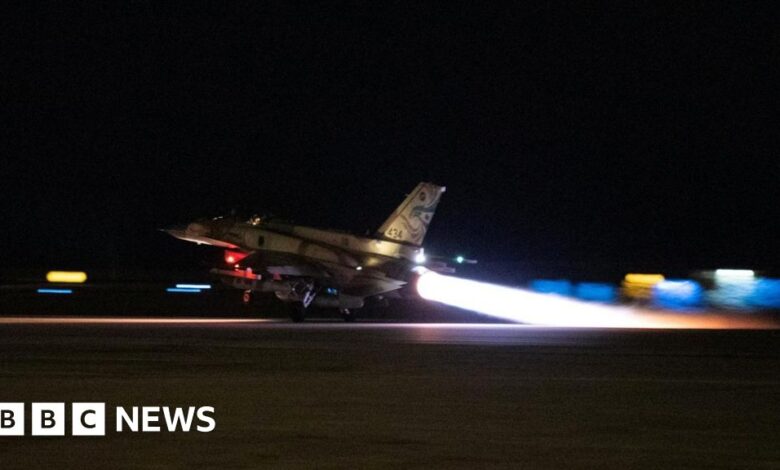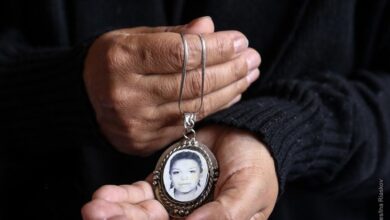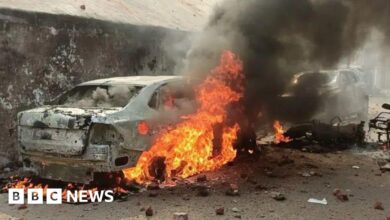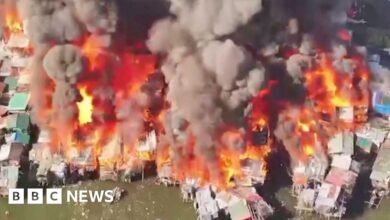Israel says 100 Hezbollah rocket launchers hit southern Lebanon

Israel said its warplanes had struck more than 100 Hezbollah rocket launchers and other “terror sites”, including a weapons storage facility in southern Lebanon.
The Israel Defense Forces (IDF) said the launchers were ready to fire at Israel. It is not yet clear if there were any casualties.
Lebanon’s state news agency said Israel carried out at least 52 air strikes in the south of the country on Thursday evening and Lebanon also attacked military sites in northern Israel.
Previously, Hezbollah leader Hassan Nasrallah said the deadly explosions earlier this week “crossed all red lines”, accused Israel of what he said was a declaration of war.
Israel has yet to acknowledge it was behind the attacks – in which pagers and walkie-talkies exploded simultaneously across the country – on Tuesday and Wednesday, which Lebanese authorities said killed 37 people and injured 3,000.
But Defense Minister Yoav Gallant said Israel was entering a “new phase of the war”, focusing more of its efforts on the north.
The previously sporadic cross-border fighting escalated on October 8, 2023 – a day after an unprecedented attack on Israel by Hamas gunmen from Gaza – when Hezbollah opened fire on Israeli positions in a show of solidarity with the Palestinians.
Since then, hundreds of people, mostly Hezbollah fighters, have been killed in cross-border fighting, and tens of thousands have been displaced on both sides of the border.
Hezbollah has said it is acting in support of the Palestinian militant group Hamas, both of which are backed by Iran and considered terrorist organizations by Israel, Britain and other countries.
In a statement late Thursday, the IDF said its warplanes “hit approximately 100 launch pads and other terrorist infrastructure, including approximately 1,000 ammunition crates ready to be used in the near future to fire towards Israeli territory.”
“The IDF will continue to operate to degrade the infrastructure and capabilities of the Hezbollah terrorist organization to defend the State of Israel.”
Lebanese security sources quoted by Reuters and the New York Times said the Israeli air strikes were among the heaviest since the war in Gaza began last October.
The IDF also urged residents in northern Israel near the Lebanese border to avoid large gatherings, protect their neighborhoods and stay close to bomb shelters.
On Thursday morning, Hezbollah fighters in southern Lebanon fired two anti-tank missiles across the border, followed by drones.
The IDF said two Israeli soldiers were killed and a third was seriously injured.
In a televised speech on Thursday, Hassan Nasrallah said of Tuesday and Wednesday’s attacks: “The enemy has crossed all rules, laws and red lines. It cares nothing, not morally, not humanitarianally, not legally.”
“This is a massacre, a massive aggression against Lebanon, its people, its resistance, its sovereignty and its security. It can be called a war crime or a declaration of war – whatever you choose to call it, it deserves and fits the description. This is the enemy’s intention,” he added.
As Nasrallah spoke, Israeli warplanes sent sonic booms over Beirut, scaring an already exhausted population, and other planes struck targets in southern Lebanon.
Hezbollah’s leader admitted that this was a heavy and unprecedented blow to his group, but he insisted that the group’s command and communication capabilities remained intact.
Nasrallah’s tone was defiant and he vowed severe punishment. But he again hinted that Hezbollah had no interest in escalating the current conflict with Israel.
He said the group’s cross-border attacks would continue unless there was a ceasefire in Gaza, and no amount of killing or assassination would bring people back to northern Israel.
The IDF said Thursday that its chief of staff, Lieutenant General Herzi Halevi, “recently completed the approval of plans for the northern arena.”
Gallant later said that “in this new phase of the war there are considerable opportunities but also considerable risks”.
“Hezbollah feels that they are being suppressed and the chain of military actions will continue,” he added.
“Our goal is to ensure the safe return of northern Israeli communities to their homeland. Over time, Hezbollah will pay an increasing price.”
It is unclear how Israel intends to achieve this goal. But reports earlier this week said the general in charge of the IDF’s Northern Command favored the creation of an Israeli-controlled buffer zone inside southern Lebanon.
US Secretary of State Antony Blinken called on all sides to exercise restraint.
“We do not want to see any escalation from any side” that would make the goal of a ceasefire in Gaza more difficult, he said as he joined European foreign ministers in Paris to discuss the spreading crisis.
British Foreign Secretary David Lammy, who also attended the talks in Paris, called for an immediate ceasefire between Israel and Hezbollah.
“We have all been very, very clear that we want to see a political solution through negotiations so that the Israelis can return to their homes in northern Israel and the Lebanese can return to their homes,” he said.




